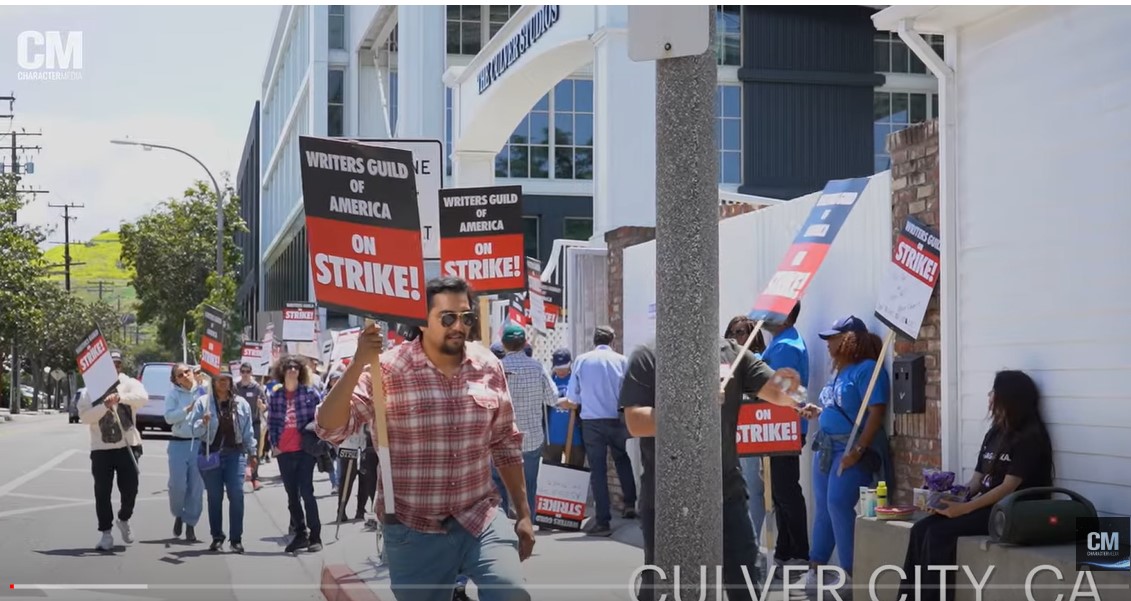After two weeks of the national writers’ strike spearheaded by the Writers Guild of America (WGA), little progress has been made between both sides.
The WGA has a raft of requests for the Alliance of Motion Picture and Television Producers (AMPTP). Those that have the most far-reaching consequences and relevance pertain to the infiltration of artificial intelligence in their profession. An issue that is of great concern to society as a whole as we wrestle with the implications of AI taking over what used to be exclusively creative fields that could only be executed by human beings. This is in the process of changing and the writers strike is serving as a watershed moment that needs to be examined in that light.
The WGA has specific proposals, including the “regulation of AI on minimum basic agreement (MBA) -covered projects; AI can’t write or rewrite literary material; can’t be used as source material; and MBA-covered material can’t be used to train AI.”
But it is precisely on these requests that the studios have no desire to negotiate. Instead, they suggest annual meetings to review evolving technology.
Ryan Steelberg, the co-founder and CEO of artificial intelligence tech company Veritone, intertwined in both intelligence and entertainment, admits there is room for improvement on both sides.

“Frankly, the quality and advancements in the technology – groups and writers, I’d say people in the creative arts, they should be concerned,” he told Fox News Digital of AI spreading in he entertainment industry. “I want to qualify what concern means. I think they need to be open and make sure they’re fully educated, as much as everybody else, on really the capabilities of these new tools,” he added. Steelberg said he understands the WGA’s reasoning for wanting to “make sure that their talent is protected…but what I’m hearing is, yes … they want guardrails, and they want due credit and attribution about, you know, what is coming out of these large language model opportunities. But to be very clear, they know what’s coming, right? They know that this is going to be a powerful tool that people who really embrace it are going to find a unique competitive advantage against those who frankly just take the binary position of resisting it,” he said.
He implied that no matter the concerns that writers may have about the use of AI, or the fear that they may indeed eventually be replaced by it, there is no going back. The best they can do—and should do—is to stay informed about the leaps that AI is making and will continue to make. Those who learn to adapt and take advantage of new technology will have the edge over those who resist change.
It is not the AI per se that will make writers obsolete, it is their inability to move forward and find the best ways to incorporate it into their creativity.
For those who will adapt and use AI, the true dilemma will be compensation.
“The guild doesn’t fear AI as much as it fears not getting paid. Burrow into the logic. It’s apparent that AI will become a force in film entertainment.”
“This, I think, is the WGA position: If a WGA member employs AI, he/she should be paid as a writer. If a producer uses AI to create a script, they must find a WGA writer to pay,” he continued.
In an op-ed piece for The Guardian, writer and member of the guild negotiating committee James Schamus wrote about the growing concerns he and his colleagues have surrounding AI. “The fact is that AI is here… I, like many of my fellow writers, am both nervous and excited about the prospect of how AI as a tool will be used in our storytelling, and I don’t think of it as a kind of binary on/off switch that will simply shut off our jobs and replace us.”

“But that just makes the conglomerates’ position even more insidious,” he continues. Schamus fears that “the power of capital can use every tool at its disposal to disempower workers as they transform what used to be jobs into endless, frantic scrambles for gigs.” Already many writers complain that the job involves more and more work for less and less pay and that they are scuttled around from gig to gig as if they were piece workers.
Domenic Romano of Romano Law is more optimistic and underlines the useful manner in which writers can incorporate AI into their craft: “Writer’s block could become a thing of the past. No need to stare at a blank screen. AI can create a starting point but will not replace human creativity and expertise, especially in the near term. Instead, it will probably serve as a tool to assist screenwriters in their craft. The final output will still depend on the skill and talent of the writer, at least in the near term.”












